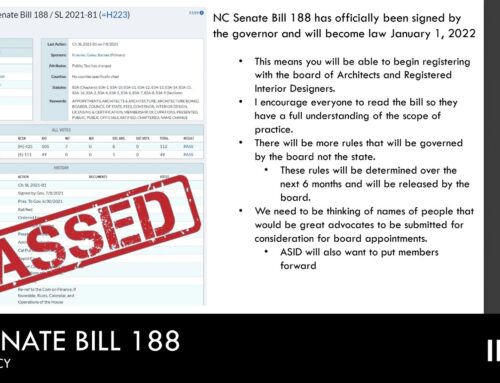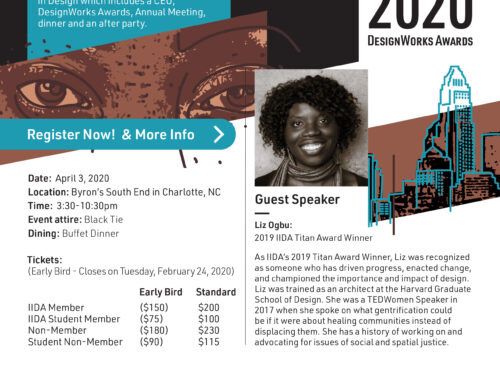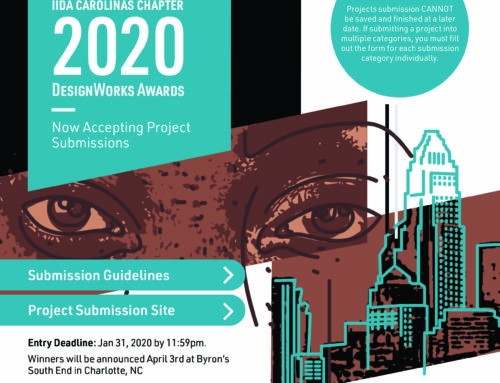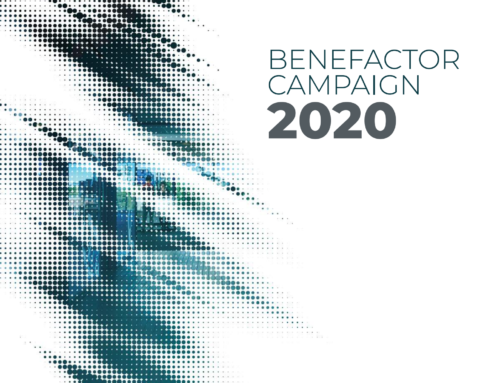Click here to REGISTER TODAY!
{Registration closes April 10th!}
Event Address:
21C Museum Hotel
111 N. Corcoran St.
Durham, NC 27701
Event Schedule:
12:30-1:00 Check-in/ Registration
1:00-2:00 Sustainability Forum speaker #1
– 15 minute – Break
2:15-3:15 Sustainability Forum speaker #2
3:15-3:45 Q&A
– 15 minute – Break
4:00-5:30 DesignWorks & Annual Meeting
5:30-6:30 Cocktail Hour
6:30 Adjourn
Event Cost:
$70 member
$90 non-member
$30 student
$50 student non-member
Sustainability Forum
CEU #1:
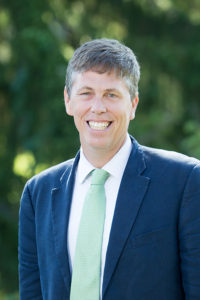 Tile: Ecophilic Design: Using the built environment as a catalyst for change
Tile: Ecophilic Design: Using the built environment as a catalyst for change
Speaker: Lee Ball Jr., PhD, Chief Sustainability Officer
Bio: Lee F. Ball Jr. has a doctorate in Sustainability Education, a master’s degree in Environmental Education, and a bachelor’s degree in Natural Science. He spent fourteen years teaching sustainability building in Appalachian State University’s Department of Sustainable Technologies and the Built Environment. Lee’s scholarly work focuses on sustainability literacy, the valuation of sustainability, biophilic/ecophilic design, change agency, and sustainability leadership.
Lee is currently Appalachian State University’s Director of Sustainability. He is also the co-chair and a founding member of Appalachian State University’s Sustainability Council. Lee is an integral part of the university’s leadership and is involved with many decisions related to campus master planning and strategic planning. He is also active globally and leads international programs to Peru, Columbia, Brazil, and Australia. In addition, Lee is on the board of numerous local and regional sustainability focused non-profit organizations.
Course Description: Ecophilic design uses ecological systems as model and inspiration for sustainability innovation within the built environment and beyond. The course will provide an overview of biophilic and ecophlic design principles. The course will also demonstrate how this innovative approach to design can benefit building users, communities and the environment.
Course Hours: .1 IDCEC Credit Hours
CEU #2:
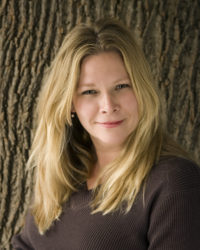 Title: Factory Like A Forest, Products Like Trees
Title: Factory Like A Forest, Products Like Trees
Speaker: Chris McCurry
Bio: Chris McCurry is the co-founder-owner of The Bark House, a natural manufacturing company of over 25 years. This company is the recipient of the world’s first and only Cradle to Cradle Platinum product certification; B-Corp Best for the World, Regenerative-Business and Architectural Product of the Year Awards. She is also the co-author of Bark House Style, Sustainable Designs From Nature, published by Gibbs-Smith.
A practitioner of regenerative design, Chris was educated in Nursing – a field that brings together Arts and Science in a deep inquiry into human systems. She wrote her Master’s study in 2000 through an independent program at Montpelier College on Whole-Systems Theory and uses this foundation as a basis for her work in business today. Featured in over 250 prominent design magazines and blogs, her work is reflected in the projects that her design customers create.
A strong advocate for place-making, Chris is from the Appalachian Mountains of North Carolina, and has traveled to nearly 30 countries around the world exploring different cultures and architecture.
For more information on her work, visit BarkHouse.com/Authentic
Course Description: What if a factory was moving next door to you? Would you worry about your water and air quality being impacted negatively? What about the property value in your neighborhood?
But what if that factory resonated the essence of a forest? Could an industry’s processes and products positively impact the air, water, soil and holistic health to improve your neighborhood? How could we quantitatively measure industrial inputs? Are there ways to qualitatively measure company impacts on human health and spirit to enhance people’s lives and build a whole- community?
How would we begin to define shared prosperity in a system such as this? A forest has many functions and attributes that support planet health. It holds carbon, improves water quality and builds clean soil. It also holds a space for people to have a personal experience connecting with the power of raw nature. This is often translated into cultural identity and community building. A forest reflects regenerative processes and contributes to whole-communities, helping us think about old definitions of prosperity. This presentation is about a factory with whole-system processes that are like a forest and products that biomimic trees. It will look at process, product and place, and how each contributes to building whole-communities. The Appalachian Mountains, where the factory is located has rich soil. The forests are diverse. Old andworn, wise and wild, this place is a part of the people – and the people are a part of this place. We will explore quantitatively and qualitatively how a factory has given voice to what that means.
Course Hours: .1 IDCEC Credit Hours
Activities
- Guided docent tour
- Self guided tour of the galleries for free
- Test out the restrooms with the clear to opaque doors and walls
- Dine in the hotel restaurant, Counting House
Link to neighborhood guide provided by 21C https://www.21cmuseumhotels.com/durham/neighborhood/map/
Parking:
You can valet your car at the hotel or use a nearby parking garage, Corcoran Street Garage, located at the corner of Corcoran St and Ramseur St.
Room Block Info:
Link to book rooms: https://gc.synxis.com/rez.aspx?Hotel=62063&Chain=7748&arrive=4/20/2018&depart=4/21/2018&adult=1&child=0&group=DESIGN21C
Use code DESIGN21C to get our reduced rate of $169 a night plus taxes and fees.
Cut off date is March 21st, 2018 to book hotel rooms under our IIDA Carolinas rate


